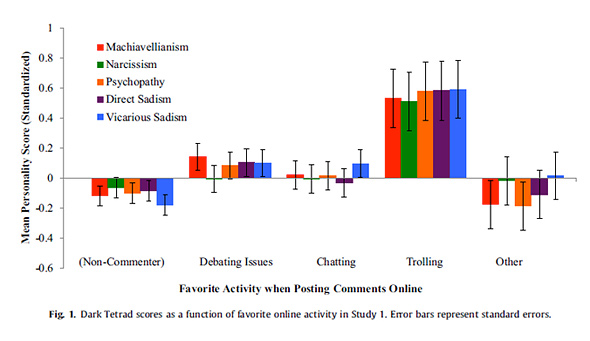Filtered By: Scitech
SciTech
Internet trolls have real personality problems, study shows
Anyone who’s a regular internet user has most likely encountered “internet trolls” – people who lurk anonymously in online forums and the comments sections of articles, spewing insults at others and creating havoc.
A research team, which defines online trolling as “the practice of behaving in a deceptive, destructive, or disruptive manner in a social setting on the Internet with no apparent instrumental purpose,” examined whether these so-called trolls exhibit traits that fall into the “Dark Tetrad”.
The Dark Tetrad of personality problems includes Machiavellianism, or the eagerness to deceive, manipulate, and exploit others; narcissism, or self-obsession, pride, and excessive conceitedness; psychopathy, which is characterized by antisocial behavior and the inability to experience remorse or empathy; and sadism, which is the enjoyment in causing others pain.
The results of two online studies reveal significant correlations between these problematic traits and cyber-trolling behavior, with sadism ranking as the most common among trolls.
The team also found that the worse these issues were in the individual, the more time that person spent online.
The Global Assessment of Internet Trolling (GAIT)
The research team, consisting of Erin Buckels and Paul Trapnell of the University of Manitoba, as well as Delroy Paulhus of the University of British Columbia, conducted two studies to gather information about internet trolls.
“Respondents completed personality inventories and a survey of their Internet commenting styles,” said the team.
A survey instrument called “Global Assessment of Internet Trolling”, or GAIT, was used. In it, volunteers were introduced to a variety of statements. They then had to check the statements which they agreed with. Examples of the survey items include the following:
- “I have sent people to shock websites for the lulz.”
- “I like to troll people in forums or the comments section of websites.”
- “I enjoy griefing other players in multiplayer games.”
- “The more beautiful and pure a thing is, the more satisfying it is to corrupt.”
Trolls were also identified by asking the survey participants simple questions, such as what they “enjoyed doing most” when visiting comments sections of websites. This particular example gave the participants five answers to choose from: “debating issues that are important to you,” “chatting with others,” “making new friends,” “trolling others,” and “other.”
When data gathered from questions created to identify Dark Tetrad traits were compared with the data collected from questions devised to determine online users’ specific commenting preferences, the following bar graph arose:


Source: Slate.com
Sadists… they just want to have fun!
“Overall, strong positive associations emerged among online commenting frequency, trolling enjoyment, and troll identity, pointing to a common construct underlying the measures,” said the researchers.
According to the team, the tests show that trolls exhibit characteristics linked to the “Dark Tetrad” of personality traits.
“Both studies revealed similar patterns of relations between trolling and the Dark Tetrad of personality: trolling correlated positively with sadism, psychopathy, and Machiavellianism, using both enjoyment ratings and identity scores,” they explained.
The relationship was strongest between trolling and sadism: “Of all personality measures, sadism showed the most robust associations with trolling and, importantly, the relationship was specific to trolling behavior. Enjoyment of other online activities, such as chatting and debating, was unrelated to sadism. Thus cyber-trolling appears to be an Internet manifestation of everyday sadism.”
They added: “Both trolls and sadists feel sadistic glee at the distress of others. Sadists just want to have fun ... and the Internet is their playground!”
Aside from these correlations, it was also discovered that trolls are actually a minority, making up only 5.6 percent of the studies’ respondents. In contrast, 41.3 percent said they did not participate in online discussions and were therefore “non-commenters”.
The study was recently published in the online journal ScienceDirect. — TJD/VC, GMA News
More Videos
Most Popular




